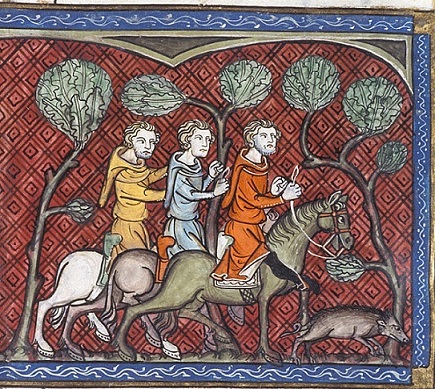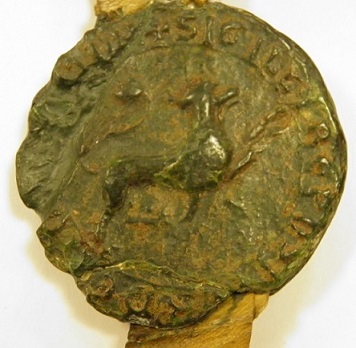John seeks the support of the people of Northampton
by Professor Nicholas Vincent
15 February 1215 - 21 February 1215
| Date | Place | Sources | Notes |
|---|---|---|---|
13, 15-16 Feb 1215 |
RLP, 152; RLC, i, 187b-8 |
Hardy, 'Itinerary', also places the King at Woodstock on 14 February, source unspecified. |
|
16-18 Feb 1215 |
RLC, i, 188-8b |
||
18-19 Feb 1215 |
RLP, 129; RLC, i, 188b |
||
19-20 Feb 1215 |
RLP, 129; RLC, i, 188b |
||
20 Feb 1215 |
RLP, 129 |
Leaving Woodstock on Monday 16 February, the King travelled via Silverstone and Blisworth to Northampton, returning southwards on Friday 20 February. This was champion sporting country, and the King's presence there, although almost certainly politically motivated, was taken as an opportunity to hunt. The present week saw the dispatch of a series of detailed instructions over the keeping of hounds and hawks, including orders for a good cart in which the King's game could be carried, and for rights of chase within the hunting preserves of the late bishop of Ely.1 Routine communications were sent to Hubert de Burgh in Poitou and to the archbishop of Dublin in Ireland, concerning land and custodies.2 Further reinforcements were sent to join the garrisons at Durham and Nottingham castle, in the latter case with specific instructions that these knights sleep within the castle at night.3 Stores of wax and wine were ordered for Berkhamsted and for Stafford, and there was a particular concern, during the King's time at Northampton, for the custody of prisoners and hostages held in the town.4
Since at least 1189, the men of Northampton had claimed the right to free election of their own reeves, a privilege duly confirmed in April 1200 by King John.5 By the time of King John's visit to Northampton in February, this had apparently been extended to the right to an elected mayor. Certainly, from Silverstone on 17 February, the King wrote to the men of the town announcing his acceptance of William Thilly as their mayor.6 Three days later, royal letters were addressed to the mayor and reeves, already supported by a council of twelve trustworthy men, whose names were to be sent to the King.7 This list of names was itself supposed to be sealed by the mayor and reeves, perhaps with a seal that survives in a unique exemplar in the Lancashire Record Office, showing what was once thought to be a 'talbot' or hunting dog, more recently identified as a distinctly Plantagenet royal lion.8
Just as the leonine seal of the reeves of Northampton was intended as a symbol of royal allegiance, so it is tempting to suggest political motives for the King's recognition of the privileges of a town standing on a crucial axis between north and south: a town that had already, as early as January, been chosen for the forthcoming negotiations between King and barons, expected to take place in late April.9 Over the next few months, the right to an elected mayor was to be recognized by John in his dealings with the men of Bayonne, crucial to the defence of the southern frontiers of Gascony. The right of mayoral election, furthermore, was to be granted to the Londoners as the very last of the King's attempts at appeasement before London itself fell into rebel hands.10 John's actions at Northampton thus suggest the first of several such attempts to buy support in a town perhaps judged all too close, and therefore susceptible, to hostile influence.
As early as 15 February, when he was at Woodstock, the King had sent instructions for the repair of Oxford castle.11 This might be considered routine were it not for the survival of the most significant of all the royal letters recorded during this week. On 19 February, from Blisworth, the King addressed letters promising safe conduct for all those 'barons of northern parts' (barones de partibus borealibus) coming to Oxford on Sunday 22 February to speak with archbishop Langton and his fellow bishops, and with William Marshal. The enrolment reports that at least three such letters were issued 'because of the diversity of the roads', presumably proclaimed to the King's subjects along all of the main routes to and from Oxford itself.12 What these letters show is that whilst the King was elsewhere, the 'northerners' gathered to treat with Langton and the bishops who, in public at least, continued to be addressed by the King as useful go-betweens in his dealings with the baronial opposition. The opposition party, far from being cowed by the King's military preparations, continued both to negotiate and to grow.
Whilst the King was in Northamptonshire, on 17 February, his envoy, Walter Mauclerk, at last reached Rome. There he set in train a series of diplomatic negotiations that in due course were to prove almost as fateful as the baronial gatherings in the north.
1 | RLC, i, 187b-8b. |
2 | RLC, i, 188b. |
3 | RLC, i, 188-8b. |
4 | Supplies, RLC, i, 188-8b. Prisoners, RLP, 129. |
5 | RC, 45b-6, and for Richard I's grant of free election of a single reeve, altered to two reeves in 1200, see Records of the Borough of Northampton, ed. C.A. Markham, i (1898), 25-31. |
6 | RLC, i, 188. |
7 | RLP, 129. |
8 | See here N. Vincent, 'The Seals of King Henry II and his Court', Seals and their Context in the Middle Ages, ed. Phillipp R. Schofield (Oxford, 2015), 7-33, esp. pp.17 figure 2.11, 19. |
9 | For the choice of Northampton as the site for future negotiations, see RLP, 126b, with full translation in January's Feature of the Month on the Conference at the New Temple. |
10 | In due course, see Diary and Itinerary, events of 19 April and 9 May 1215. |
11 | RLC, i, 187b. |
12 | RLP, 129: 'Rex omnibus has litteras inspecturis etc. Sciatis quod suscepimus in saluum conductum nostrum barones de partibus borealibus qui venturi sunt usque Oxon' die dominica in cathedra sancti Petri anno r(egni) n(ostri) xvi.mo ad loquendum cum domino Cant' archiepiscopo et coepiscopis suis et com(ite) Willelmo Mariscallo, ita quod illuc secure ire possint et ibidem morari et in partes suas reuerti. Et manucepimus quod nullum eis per nos vel nostros in eundo illuc vel ibidem morando vel reuertendo malum eueniet vel iactura. Et in huius rei testim(onium) etc. T(este) me ipso apud Blicheworth, xix. die Febr(uarii) anno r(egni) n(ostri) xvi.o Hec littere triplicate sunt propter viarum diuersitates'. |
- February 1214 - June 1214 (1)
- June 1214 - July 1214 (3)
- July 1214 - August 1214 (4)
- August 1214 - September 1214 (5)
- John hears of Bouvines and reconsiders his position
3 August 1214 - 9 August 1214 - John plans his return to England
10 August 1214 - 16 August 1214 - John’s spies intercept a letter of Aimery of Thouars
17 August 1214 - 23 August 1214 - John refuses to abandon his French lands
24 August 1214 - 30 August 1214 - John grants a truce to Philip Augustus and seeks the release of William Longespée
31 August 1214 - 6 September 1214
- John hears of Bouvines and reconsiders his position
- September 1214 - October 1214 (4)
- Negotiations with Philip Augustus
7 September 1214 - 13 September 1214 - Peace with Philip Augustus
14 September 1214 - 20 September 1214 - John’s chancery staff departs for England
21 September 1214 - 27 September 1214 - John demonstrates his willingness to rule according to law
28 September 1214 - 4 October 1214
- Negotiations with Philip Augustus
- October 1214 - November 1214 (4)
- John prepares for his passage back to England
5 October 1214 - 11 October 1214 - John’s sea journey and landing at Dartmouth
12 October 1214 - 18 October 1214 - The regency government of Peter des Roches
19 October 1214 - 25 October 1214 - From the Tower, John sends a coded message to his queen
26 October 1214 - 1 November 1214
- John prepares for his passage back to England
- November 1214 - December 1214 (5)
- Drama and jokes at Bury St Edmunds
2 November 1214 - 8 November 1214 - The matter of episcopal elections
9 November 1214 - 15 November 1214 - John grants freedom of election
16 November 1214 - 22 November 1214 - John visits Wiltshire
23 November 1214 - 29 November 1214 - King John prepares for Christmas and intimidates electors
30 November 1214 - 6 December 1214
- Drama and jokes at Bury St Edmunds
- December 1214 - January 1215 (4)
- January 1215 (4)
- February 1215 (4)
- March 1215 - April 1215 (5)
- John takes the cross, on Ash Wednesday
1 March 1215 - 7 March 1215 - John's fears of French invasion abate
8 March 1215 - 14 March 1215 - John moves to secure the frontier zone
15 March 1215 - 21 March 1215 - John hunts in Nottinghamshire
22 March 1215 - 28 March 1215 - John prepares for trouble in the North
29 March 1215 - 4 April 1215
- John takes the cross, on Ash Wednesday
- April 1215 - May 1215 (4)
- May 1215 - June 1215 (5)
- 'our barons who are against us'
3 May 1215 - 9 May 1215 - 'by the law of our realm or by judgment of their peers'
10 May 1215 - 16 May 1215 - The rebels seize London
17 May 1215 - 23 May 1215 - John negotiates with the Pope and archbishop Langton
24 May 1215 - 30 May 1215 - Negotiation with the rebels
31 May 1215 - 6 June 1215
- 'our barons who are against us'
- June 1215 - July 1215 (4)
- July 1215 - August 1215 (4)
- August 1215 - September 1215 (5)
- September 1215 - October 1215 (4)
- October 1215 (4)
- A meeting with the Cistercian abbots
4 October 1215 - 10 October 1215 - John and the siege of Rochester: week one
11 October 1215 - 17 October 1215 - Rochester week two, the siege of Norham and the return of Giles de Braose
18 October 1215 - 24 October 1215 - John and the siege of Rochester: week three
25 October 1215 - 31 October 1215
- A meeting with the Cistercian abbots
- November 1215 - December 1215 (5)
- John and the siege of Rochester: week four
1 November 1215 - 7 November 1215 - John and the siege of Rochester: week five
8 November 1215 - 14 November 1215 - John and the siege of Rochester: week six
15 November 1215 - 21 November 1215 - John and the siege of Rochester: week seven
22 November 1215 - 28 November 1215 - The fall of Rochester Castle
29 November 1215 - 5 December 1215
- John and the siege of Rochester: week four
- December 1215 - January 1216 (4)
- January 1216 (3)

